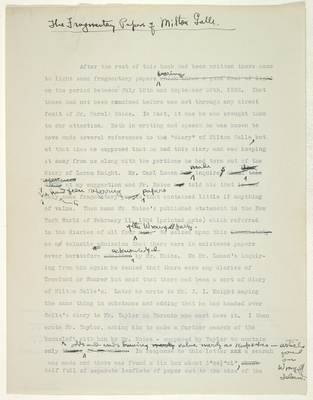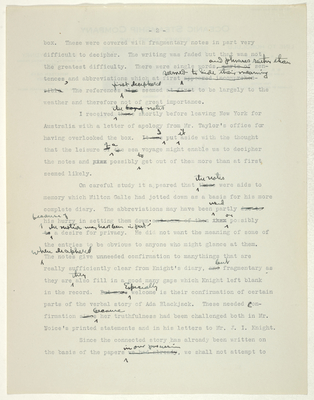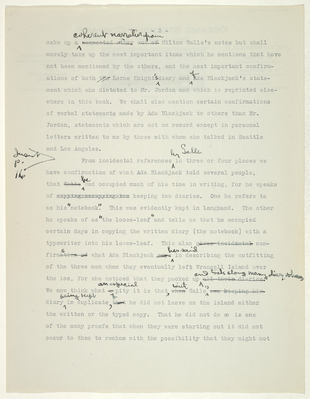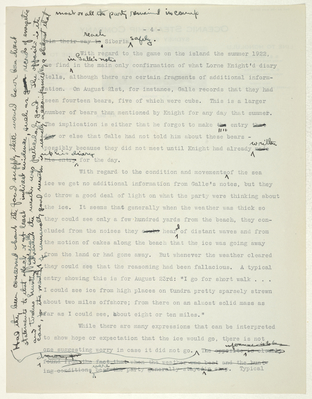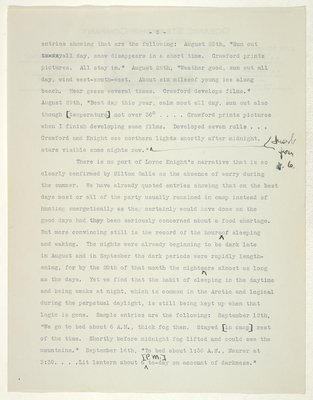Pages
stefansson-wrangel-09-30-005-001
The Fragmentary Papers of Milton Galle
After the rest of this book had been written there came to light some fragmentary papers bearing which threw a good deal of light on the period between July 18th and September 30th, 1922. That these had not been examined before was not through any direct fault of Mr. Harold Noice. In fact, it was he who brought them to our attention. Both in writing and speech he was known to have made several references to the "diary" of Milton Galle, but at that time we supposed that he had their diary and was keeping it away from us along with the portions he had torn out of the diary of Lorne Knight. Mr. Carl Lomen had made inquires about >that this diary references at my suggestion and Mr. Noice had told him that is was he had been referring only to some fragmentary papers that contained little if anything of value. Then came Mr. Noice's published statement in the New York World of February 11, 1924 (printed ante) which referred to the diaries of all four men of the Wrangell Party. We seized upon this immediately as an valuable admission that there were in existence papers never heretofore admitted acknowledged by Mr. Noice. On Mr. Lomen's inquiring from him again he denied that there were any diaries of Crawford or Maurer but said that there had been a sort of diary of Milton Galle's. Later he wrote to Mr. J. I. Knight saying the sae thing in substance and adding that he had handed over Galle's diary to Mr. Taylor in Toronto who must have it. I then wrote Mr. Taylor, asking him to make a further search of the boxesleft with him by Mr. Noice - supposed by taylor to contain only things of no value. odds and ends having value merely as keepsakes - articles found on Wrangel Island. In response to this letter xxx a search was made and there was found a tin box aabout 3"x41/2"x1", about half full of separate leaflets of paper cute to the size of the
stefansson-wrangel-09-30-005-002
- 2 -
box. These were covered with framentary ntoes in part very difficult to decipher. The writing was faded but that was not the greatest difficulty. There were single words, and part of sentences, and abbreviations which as first seemed to hide their meaning appeared incomprehensible. The references first deciphered also seemed at first to be largely to the weather adn therefore not of great importance.
I received the box of notes these shortly before leaving New York for Australia with a letter of apology from Mr. Taylor's office for having overlooked the box. It was I put it aside with the thought that the leisure of aof the sea voyage might enable us to decipher the notes and xxxx possibly to get out of them more than at first seemed likely.
On careful study it appeared that the notes these were aids to memory which Milton Galle had jotted down as a basis for his more complete diary. The abbreviations may have been used partly due to because of his hurry in setting them down; and some of them xxxx or possibly to
stefansson-wrangel-09-30-005-003
-3-
make up a coherent narrative from connected story out of Milton Galle's notes but shall merely take up the most important items which he mentions that have not been mentioned by the others, and the most important confirmations of both the Lorne Knight's diary and of Ada Blackjack's statement which she dictated to Mr. Jordon and which is reprinted elsewhere in this book. We shall also mention certain confirmations of verbal statements made by Ada Blackjack to others than Mr. Jordon, statements which are not on record except in personal letters written to me by those with whom she talked in Seattle and Los Angeles.
Insert p.16
From incidental references by Galle in three or four places we have confirmation of what Ada Blackjack told several people, that Galle he had occupied much of his time in writing, for he speaks of copying [] two keeping two diaries. One he refers to as his "notebook." This was evidently kept in longhand. The other he speaks of as "the loose-leaf" and tells us that he occupied certain days in copying the written diary (the notebook) with a typewriter into his loose-leaf. This also gives incidental confirmsation of what Ada Blackjack says has said in describing the outfitting of the three men when they eventually left Wrangell Island over the ice, for she noticed that they packed up and took along many diary volumes all their diaries. We now think what a an especial pity it is that, when with Galle is was keeping his diary Being kept in duplicate, that he did not leave on the island either the written or the typed copy. That he did not do so is one of the many proofs that when they were starting out it did not occur to them to reckon with the possibility that they might not
stefansson-wrangel-09-30-005-004
- 4 -
win their way to reach Siberia safely.
With regard to the game on the island the summer 1922, we find in Galle's notes in the main only confirmation of what Lorne Knight'd diary tells, although there are certain fragments of additional information. On August 21st, for instance, Galle records that they had seen fourteen bears, five of which were cubs. This is a larger number of bears than mentioned by Knight for any day that summer. The implication is either that he forgot to make the entry that day or else that Galle had not told him about these bears - possibly because they did not meet until Knight had already written made his entry up his diary for the day.
With regard to the condition and movementof the sea ice we get no additional information from Galle's notes, but they do throw a good deal of light on what the party were thinking about the ice. It seems that generally when the weather was thick so they could see only a few hundred yards from the beach, they concluded from the noises they could heard of distant waves and from the motion of cakes along the beach that the ice was going away from the land or had gone away. But whenever the wreather cleared they could see that the reasoning had been fallacious. A typical entry showing this is for August 23rd: "I go for short walk . . . I could see ice from high places on tundra pretty sparsely strewn about two miles offshore; from there on an almost solid mass as far as I could see, about eight or ten miles."
While there are many expressions that can be interpreted to show hope or expectation that the ice would go, there is not one suggesting worry in case it did not go. Had they been concerned by the food supply there would have been direct statements to that effect, or at least indirect evidence, such as good records of energetic and tireless hunting especially whenever the weather was particularly good. The opposite is the case, for the mention of unusually good weather is usually accompanying a statement that most or all the party remained in camp. The opposite inference is to be is clearly drown, for found from the fact that when the weather was best and the hunting conditions were best the party generally stayedin camp. Typical
stefansson-wrangel-09-30-005-005
- 5 -
entries showing that are the following: August 25th, "Sun out
todayall day, snow disappears in a short time. Crawford prints pictures. All stay in." August 26th, "Weather good, sun out all day, wind west-south-west. About six milesof young ice along beach. Hear geese several times. Crawford develops films." August 29th, "Best day this year, calm most all day, sun out also though [temperature]not over 36° .... Crawford prints pictures when I finish developing some films. Developed seven rolls . . . Crawford and Knight see northern lights shortly after midnight, stars visible some nights now." Insert from p. 6.
There is no part of Lrne Knight’s narrative that is so clearly confirmed by Milton Galle as the absence of worry during the summer. We have already quoted entries showing that on the best days most or all of the party usually remained in camp instead of hunting energetically as they certainly would have done on the good days had they been seriously concerned about a food shortage. But more convincing still is the record of the hoursof sleeping and waking. The nights were already beginning to be dark late in August and in September the dark periods were rapidly lengthening, for by the 20th of that month the nightsare almost as long as the days. Yet we find that the habit of sleeping in the daytime and being awake at night, which is common in the Arctic and logical during the perpetual daylight, is still being kept up when that logic is gone. Sample entries are the following: September 12th, "We go to bed about 6 A.M. , thick fog then. Stayed [in camp] rest of the time. Shortly before midnight fog lifted and could see the mountains." September 14th, "To bed about 1:30 A.M., Maurer at 3:30. . . .Lit lantern about 6 [P.M.] to-day on account of darkness."
